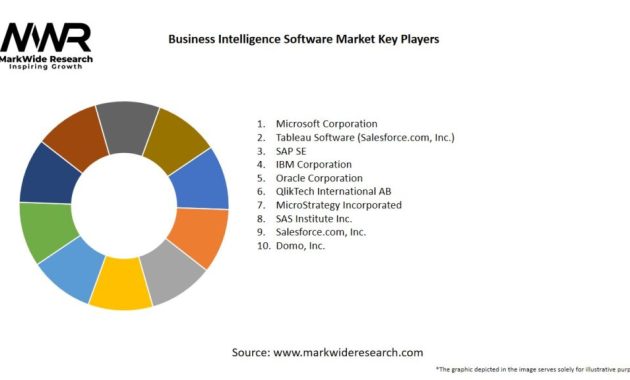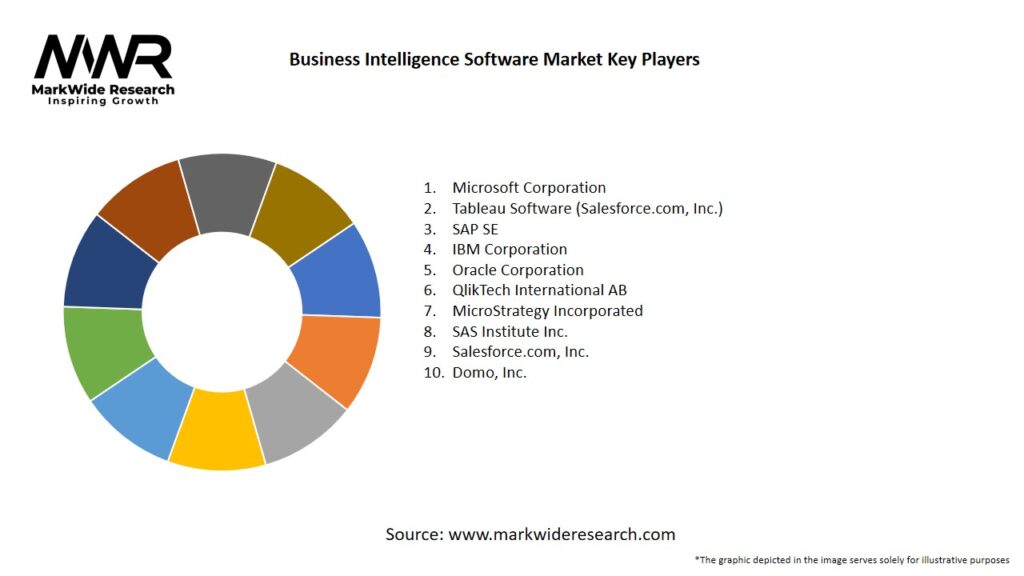
How Business Intelligence Software Increases Accuracy: A Deep Dive
In today’s data-driven landscape, the ability to make informed decisions is paramount. Businesses are constantly seeking ways to improve their operational efficiency and profitability. One of the most effective tools available is business intelligence (BI) software. This powerful technology helps organizations analyze complex data sets. It transforms raw data into actionable insights. A key benefit of BI software is its ability to significantly increase accuracy. This article explores how BI software achieves this, providing a comprehensive overview of its impact on various business functions.
Understanding the Core of Business Intelligence
Business intelligence software encompasses various tools and technologies. These are designed to collect, process, and analyze data. The goal is to provide valuable insights for decision-making. BI systems typically integrate data from multiple sources. This includes databases, spreadsheets, and cloud applications. The integrated data is then transformed into a format that is easy to understand. This often involves the use of dashboards, reports, and data visualizations. These elements enable users to quickly grasp key trends and patterns. This understanding is crucial for making accurate predictions and sound decisions.
Data Accuracy: The Foundation of Reliable Insights
Data accuracy is the cornerstone of effective business intelligence. If the data used for analysis is flawed, the insights derived from it will also be unreliable. This can lead to poor decision-making and missed opportunities. BI software plays a crucial role in ensuring data accuracy. It does this through several mechanisms.
- Data Validation: BI tools often include built-in data validation features. These features help to identify and correct errors in the data. This includes checking for inconsistencies, missing values, and outliers.
- Data Cleansing: Data cleansing processes remove or correct inaccurate data. This process ensures that the data used for analysis is as clean and reliable as possible.
- Data Standardization: BI software can standardize data formats. This ensures that all data points are consistent and comparable. This is particularly important when integrating data from multiple sources.
- Automated Data Integration: Automated data integration reduces the risk of manual errors. It streamlines the process of collecting and consolidating data from various sources.
By implementing these measures, BI software helps to ensure that the data used for analysis is accurate and reliable. This leads to more accurate insights and better decision-making.
How BI Software Enhances Accuracy Across Business Functions
The benefits of BI software extend across various business functions. Its impact on accuracy can be seen in several key areas:
Sales and Marketing
In sales and marketing, accurate data is essential for understanding customer behavior. BI software helps track sales performance, identify market trends, and optimize marketing campaigns. By analyzing sales data, businesses can identify their top-performing products. They can also understand customer preferences and tailor their marketing efforts accordingly. This leads to increased sales and improved return on investment (ROI). Accurate data also helps to segment customers. This allows for more targeted marketing campaigns. This increases the likelihood of conversion. BI software empowers sales teams. It provides them with real-time insights into sales performance. This enables them to make data-driven decisions.
Financial Analysis
Financial analysis relies heavily on accurate financial data. BI software can automate the process of collecting and analyzing financial information. This reduces the risk of errors and improves the efficiency of financial reporting. BI tools can also be used to create financial forecasts. These forecasts are based on historical data and current market trends. This allows businesses to make more informed decisions about budgeting, investment, and resource allocation. Accurate financial data also helps businesses to comply with regulatory requirements. It can help them identify potential risks and opportunities.
Operations and Supply Chain
In operations and supply chain management, accuracy is critical for optimizing processes and reducing costs. BI software can be used to track inventory levels, monitor production efficiency, and manage supply chain logistics. By analyzing operational data, businesses can identify bottlenecks. They can also identify areas where they can improve efficiency and reduce waste. BI tools can also be used to predict demand. This helps businesses to optimize inventory levels and avoid stockouts. Accurate data ensures that businesses can deliver products on time. It also ensures they can manage their supply chain effectively.
Human Resources
Human resources (HR) departments can leverage BI software to improve the accuracy of their data. This includes tracking employee performance, managing payroll, and analyzing workforce trends. By analyzing HR data, businesses can identify areas where they can improve employee engagement. They can also identify potential training needs. BI tools can also be used to track employee turnover. This helps businesses understand the reasons for employee departures. This information is crucial for improving employee retention. Accurate HR data helps businesses make informed decisions about staffing. It also helps them develop effective HR strategies.
Real-World Examples of Accuracy Gains
Several companies have successfully used BI software to improve data accuracy. They have also improved their decision-making. Here are a few examples:
- Retail: A large retail chain used BI software to analyze sales data. They identified a trend of increasing sales of a particular product. They accurately predicted future demand. This led to optimized inventory management and reduced stockouts.
- Healthcare: A healthcare provider used BI software to analyze patient data. They identified patients at high risk of readmission. This enabled them to implement preventative measures. This led to improved patient outcomes and reduced healthcare costs.
- Manufacturing: A manufacturing company used BI software to track production efficiency. They identified bottlenecks in their production process. They then implemented process improvements. This resulted in increased productivity and reduced waste.
These examples highlight the tangible benefits of BI software. This software increases accuracy across different industries.
Implementing BI Software for Accuracy
Implementing BI software requires careful planning and execution. Here are some key considerations:
- Define Business Goals: Clearly define the business goals that the BI initiative should support. This helps in selecting the right BI tools. It also helps in determining the data sources to be used.
- Choose the Right Tools: Select BI software that meets the specific needs of the business. Consider factors such as data integration capabilities, data analysis features, and reporting options.
- Ensure Data Quality: Prioritize data quality throughout the implementation process. Implement data validation and cleansing procedures.
- Provide Training: Provide adequate training to users on how to use the BI software. This ensures they can effectively interpret the data and make informed decisions.
- Monitor and Evaluate: Continuously monitor the performance of the BI system. Evaluate the effectiveness of the insights generated. Make adjustments as needed.
By following these steps, businesses can successfully implement BI software. They can then reap the benefits of increased accuracy and improved decision-making.
The Future of Accuracy with BI Software
The future of business intelligence is bright. As technology continues to evolve, BI software will become even more powerful. It will also become more accessible. Advancements in artificial intelligence (AI) and machine learning (ML) are already transforming the way businesses analyze data. These technologies are being integrated into BI platforms. This enables more sophisticated data analysis. AI and ML can automate data analysis tasks. They can also identify patterns and predict future trends with greater accuracy. This will further enhance the ability of businesses to make data-driven decisions. The use of cloud-based BI solutions is also on the rise. These solutions offer greater flexibility and scalability. They also reduce the need for expensive on-premise infrastructure. This makes BI software more accessible to businesses of all sizes. The future of business intelligence will be characterized by increased accuracy. It will also be characterized by greater insights. These will enable businesses to stay ahead of the competition.
Conclusion: Accuracy as a Competitive Advantage
In conclusion, business intelligence software is a critical tool for increasing accuracy. It is also an essential component of effective decision-making. By ensuring data accuracy, BI software empowers businesses to gain valuable insights. These insights drive improved performance across all functions. From sales and marketing to financial analysis and operations, the benefits of BI software are clear. Businesses that embrace BI software gain a significant competitive advantage. They are able to make more informed decisions. They also become more agile and responsive to changing market conditions. As the business landscape becomes increasingly complex, the need for accurate, reliable data will only grow. Investing in BI software is a strategic move. It is a move that positions businesses for long-term success.
The implementation of business intelligence software directly leads to increased accuracy. This is because the software focuses on the integrity of data. It also works on the precision of insights. It provides a more complete picture. This allows for better decision-making.
Business intelligence software is designed to provide a holistic view. It uses the data to reveal patterns. It also reveals trends. This is why the accuracy of the data is vital. The software helps in making decisions. These decisions are based on facts. This leads to more informed choices.
The ability of business intelligence software to enhance accuracy is a key benefit. It provides businesses with a competitive edge. It also allows them to make data-driven decisions. These decisions are crucial for success.
Business intelligence software’s role in improving accuracy also includes data validation. It also includes data cleansing, and standardization. These processes are essential for ensuring data integrity. This is why the insights are reliable.
The core function of business intelligence software is to transform data. It turns data into actionable insights. This is why the accuracy of the data is so vital. It ensures the insights are valuable.
Business intelligence software is a powerful tool. It helps increase accuracy. It also helps businesses make better decisions. This is especially true in today’s data-driven world.
The use of business intelligence software leads to better accuracy. This is because it eliminates manual errors. It also automates data integration. This is why the insights are more reliable.
By focusing on accuracy, business intelligence software enables businesses to optimize various processes. This includes sales, marketing, and operations. This leads to higher efficiency.
The impact of business intelligence software is undeniable. It is a key driver for accuracy in decision-making. It is a crucial tool for businesses. These businesses want to gain a competitive advantage.
Business intelligence software helps to identify errors and inconsistencies. This process is a core feature of its ability to ensure accuracy. This ensures the insights are reliable.
The advantages of business intelligence software are clear. It improves accuracy. It also improves the quality of data. This is why businesses should embrace this technology.
Business intelligence software is not just about collecting data. It is about ensuring its accuracy. It is about transforming that data into valuable insights. This is what drives success.
Business intelligence software provides a framework for data-driven decision-making. This framework relies on accuracy. This is why businesses can make informed choices.
Business intelligence software provides a path toward increased accuracy. This is why businesses can trust the insights. It is how they can make better decisions.
The future of business intelligence software is one of increased accuracy. This is because of advancements in AI and ML. This enables more insights.
The implementation of business intelligence software is vital. It ensures accuracy. It is a smart investment. It will help businesses thrive.
Business intelligence software is a cornerstone of data-driven decision-making. It boosts accuracy. It is a must-have for business success.
By prioritizing accuracy, businesses can unlock the full potential of business intelligence software. This will lead to growth.
[See also: Data Visualization Best Practices]
[See also: How to Choose the Right BI Tool]
[See also: The Role of AI in Business Intelligence]

